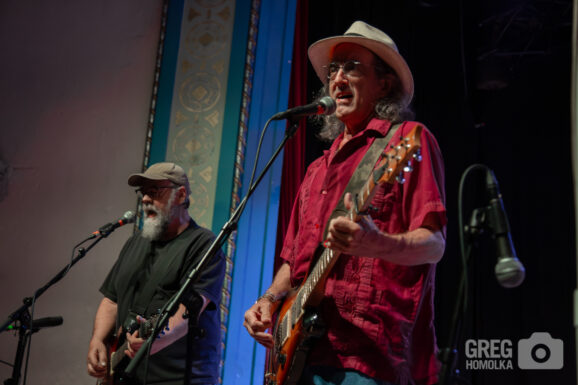The seventh studio album by The Band, Islands,(released 3/15/77) is the final such effort from the group’s original lineup. And its deceptively picturesque cover image is as telling as its title: a sunny vista encircled by profiles of the five group members far removed from the bright horizon. The distant perspective filtered through images enshrouded in shadow corresponds to the incremental estrangement that took place within the group’s ranks over the years following their initial move to Woodstock in 1966. The quintet’s intra-band disenchantment arguably reached its nadir during the period these cuts were recorded, the logical extension of which was a tacit disagreement (at the time) about the end of their touring days.
Primarily composed of previously-unreleased songs, the LP was released to fulfill the group’s contract with Capitol Records so that the soundtrack to their film The Last Waltz could be released on Warner Bros. Not surprisingly, in Robbie Robertson’s autobiography Testament, the titular leader/chief composer/guitarist for the iconic ensemble vividly describes the rush to complete the album as preparations began for the mythic concert: his head was into the recording project only slightly more than The Band itself as the quintet worked on these songs a few years prior.
As author Chris Morris delineates in his essay for the expanded CD of Islands, most of the tracks had their gestation in the group’s Malibu, California studio Shangi-La, prior to the recording of the stellar Northern Lights, Southern Cross. Much more than the material itself (by and large), the individual and collective style(s) of playing and singing by The Band is the only readily apparent distinction of this slapdash effort and even so, for the better part of its playing time, it’s lacking the spark and versatility of their best work, including but not limited to, the aforementioned 1975 LP.
Take “Ain’t That A Lot of Love,” for instance. The horns sound flaccid, even led by multi-instrumentalist Garth Hudson (who takes some sparkling sax solos elsewhere). Meanwhile, Levon Helm’s singing sounds curiously detached and the gait of the group is stilted as they play, certainly a far cry from the gusto with which they parlay a tune of similarly soulful vintage, “Don’t Do It,” from the live Rock of Ages album. Yet for the sake of fair comparison, it doesn’t even hold a candle to the studio outtake of that same Motown tune on the 2000 reissue of 1971’s Cahoots.
In keeping with the flat dynamics of the audio itself, The Band is borderline lethargic even on the (relatively) best of Robbie Robertson’s originals. Make no mistake, the two numbers book-ending the ten tracks are pleasant enough, but on both paeans to the author’s love life, “Right As Rain” and “Livin’ In A Dream,” the author’s trading in cliches. Likewise, “Let The Night Fall” is crafted well enough, but the songwriter has no point to make—little wonder the group can’t get excited about playing it. Meanwhile, on “Knockin’ Lost John,” Robertson fails to evoke time and place during as vividly as he did with “The Night They Drove Old Dixie Down.”
Descriptions of ‘The Great Depression’ on the former sound as hollow as those of the Civil War era on the latter sound true-to-life. Likewise, a collaboration with the late bassist Rick Danko, “Street Walker” pales in comparison to the character portrait that is “Unfaithful Servant,” one of the slightly hidden gems of The Band’s sophomore album. But just as, via “Whispering Pines,” Richard Manuel was the unsung hero of ‘The Brown Album’ (as it’s come to be known over the years based on the color scheme of its cover), so does the late keyboardist/vocalist render the high point(s) here: in both takes of the standard “Georgia On My Mind,” the man’s voice aches as he sings, exorcising his demons, at least temporarily, for the sake of the song.
The distinction is virtually indecipherable between a previously-unreleased outtake on the reissue and the version as first included on Islands. Likewise, this version of “Twilight” is no different than that which was released as a single (and included on 1976’s The Best of The Band). Still, it’s a cut above most of what precedes it because Danko’s voice and phrasing convey all the nuances of the conflicting emotions this particular time of day can elicit. As a result, it only makes the predictable title song instrumental seem more slight than it is.
“Christmas Must Be Tonight” is certifiably touching as Rick sings it too. His tender vocal ideally suits the subject matter. Otherwise, however, it’s as if the collective heart of this iconic ensemble isn’t really in its performance and that might well sum up Islands, looking back (and listening) with forty-five years hindsight. Having recruited Jim Weider on guitar, Hudson, Danko, Helm and Manuel would reunite for the road in 1983, but the latter, unfortunately, died by suicide three years later, before the reconfigured lineup produced three more studio albums.
Jericho, High on the Hog and Jubilation only vaguely recall the mystery of Music From Big Pink, but it’s fair to say more honesty pervades the music than that which appears on their immediate predecessor in the checkered discography of The Band.











